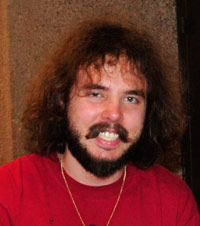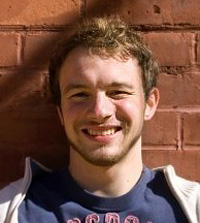Mishara-Blomberger ’11, West ’11 Receive Goldwater Scholarships
From the day Carl T. West ’11 arrived on Wesleyan’s campus, he wanted to study the fundamentals of quantum mechanics.
Although reluctant at first, Tsampikos Kottos, assistant professor of physics, welcomed the eager frosh to his “Complex Quantum Dynamics and Mesoscopic Phenomena” research group.
“To be honest, Carl was a kind of an experiment, for me,” Kottos says. “I usually take sophomores and above at my group, but Carl was so confident on what he wanted, so I decided to involve a freshman in our research. It was a good and decision.”

In the past two years, West wrote an article that was accepted to an international physics journal, presented research to the American Physical Society, and worked out a system dealing with quantum chaos studies with results Kottos had not seen before. And in April, West, along with Jonas Mishara-Blomberger ’11, received a Barry M. Goldwater Scholarship for the 2009-10 academic year.
The Goldwater Scholarship Award, established by Congress in 1986, is the most prestigious national undergraduate scholarship in mathematics, physics and engineering. Of the 1,097 applicants nominated by faculty members, only 278 students were selected to receive the scholarship.
West, a mathematics, physics and philosophy triple major, and Mishara-Blomberger, a mathematics and physics double major, will each receive a $7,500 scholarship to help cover the cost of tuition, fees, books, and room and board for their junior and senior year. They will join Kottos at the Max-Planck Institute in Göttingen, Germany this summer.
“It is very exciting for me to receive the Goldwater Fellowship because it is both a great honor and also gives me encouragement to continue pursuing my goals to do research in physics and mathematics,” Mishara-Blomberger says.

Mishara-Blomberger applied for the Goldwater scholarship while working with Assistant Professor of Physics Greg Voth’s research group on dynamic phenomena of granular gasses. By vibrating a glass chamber filled with 3mm-wide glass spheres, the Voth lab achieved a system of macroscopic particles that have similar properties to a gas.
“Whereas in a gas, you usually cannot acquire data of individual molecules, in our quasi-2-dimensional granular gas we can measure the trajectories of every particle. This direct measurement allows us to calculate variables like pressure, stresses, and viscosity of our system at any given height and time,” Mishara-Blomberger explains.
He will join Kottos’ group this summer to study current relaxation for systems with phase transition (for example how light intensity decays out of a leaking cavity filled with random scatterers).
“It is one of the research lines very close to the same family of problems that Carl and former students have worked on in the past,” Kottos explains. “I am optimistic that Jonas will also come up with a new strong result.”
West will begin a new project, studying how an initial excitation, evolves in time for two systems which are very similar to one-another. This study aims to quantify the sensitivity of dynamics of a complex mesoscopic system to small perturbations. These perturbations are associated with fabrication errors of the mesoscopic device, changes in the environmental temperature etc.
“Here the systems are too big to describe using exact Quantum mechanics, but too small for Newtonian mechanics to work well either. So, these systems allows us to probe fundamental types of questions regarding the agreement of classical and quantum descriptions of chaos,” West explains. “In fact, we are even able to examine the dynamics, that is, how the system changes in time, which is an exceptionally difficult problem.”
In 2008, Goldwater Scholarships went to Noah Biro ’09 a molecular biology and biochemistry and sociology double major, and Alison Ringel ’09, a molecular biology and biochemistry and physics double major.
“This continues the great 2008 success of our Wesleyan undergraduates in the annual competition,” says Reinhold Blumel, the Charlotte Augusta Ayers Professor of Physics, chair of the Physics Department. “Both Jonas and Carl are doing great work in physics, and this, no doubt, attests to Wesleyan’s strength in the sciences and mathematics.”
After Wesleyan, West hopes to pursue a Ph.D in physics and become a research professor; whereas Mishara-Blomberger is planning to attend graduate school for either mathematics or theoretical physics.
“I feel very strongly that my getting this award reflects the strength of Wesleyan’s Physics Department and the amazing commitment we have to undergraduate research,” West says. “What I have been able to do in the past four semesters is totally impossible at most major universities, but here at Wes it is not only doable but encouraged.”
In addition to sharing the Goldwater Scholarship, Mishara-Blomberger and West also received the Johnston Prize in 2008. The prize is awarded to those first-year students or sophomores whose performance in their first two semesters of physics shows exceptional promise.
In April 2009, they each received the Karl Van Dyke Prize, awarded each year to one or more students either majoring in physical science or having a predominant interest in physical science and technology, and who show outstanding achievement in academic work and a promise of productivity in a professional career. They were nominated by faculty in the Physics Department.

